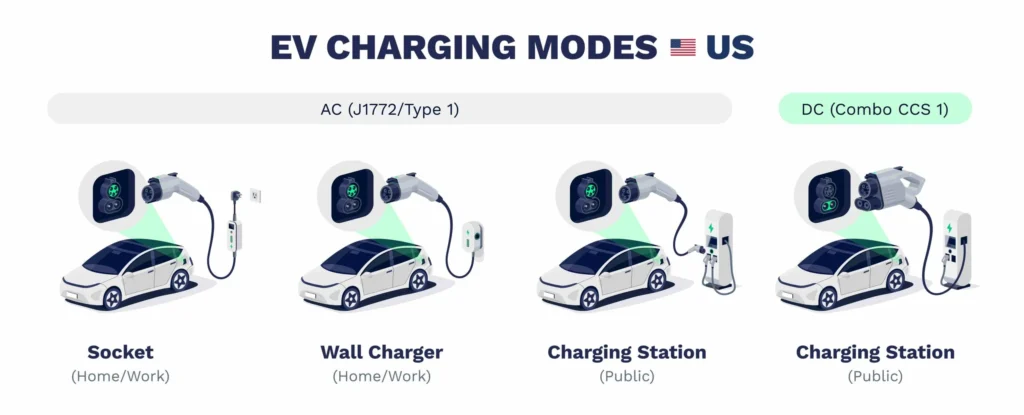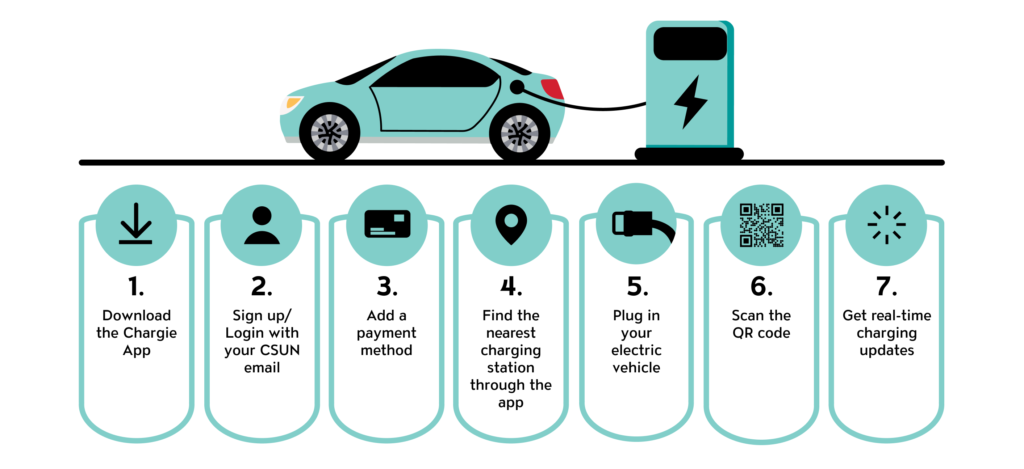EV charging station cables are an essential component in connecting electric vehicles to charging equipment. These cables not only transmit electrical energy but also ensure the safety and efficiency of the charging process.
Let’s take a closer look at the different types of cables used in EV charging stations and the differences between them.
What types of cables are used in EV chargers?
Electric vehicle charging station cables are an essential component used to connect electric vehicles and charging equipment.
These cables not only transmit electrical energy, but also ensure the safety and efficiency of the charging process.
There are two main types of cables used in EV charging stations:
- Alternating current (AC) charging cables : These cables are used for slower, everyday charging and are typically used at home or work. AC charging cables have charging powers ranging from 7.2kW to 22kW. Common AC charging connector types include Type 1 and Type 2.
- Direct current (DC) charging cables :These cables are used for fast charging and are typically used at public fast charging stations. DC charging cables can charge up to 350kW, which is very fast. Common DC charging connector types include CHAdeMO, CCS Combo 1, and CCS Combo 2.

What is the difference between cables for DC chargers and AC chargers?
The main differences are:
- Charging speed: DC cables provide higher charging power, so they charge faster. AC cables charge more slowly.
- Current conversion: AC cables require an onboard charger to convert AC to DC, while DC cables can charge the battery directly without conversion.
- Cable size: DC cables are usually thicker and heavier than AC cables because they transmit more power.
- Use scenarios: AC cables are more suitable for daily slow charging, such as charging at home or at work. DC cables are more suitable for fast charging during long trips.
Are all EV charging cables the same?
Not all EV charging cables are created equal. There are several different types of plugs and connectors:
- Type 1 plug :This is not as common these days. It can be used for slow or fast charging, but not for fast charging. It appeared on the original Nissan Leaf and Mitsubishi Outlander PHEV.
- Type 2 plug :This is the European standard and the most common choice on the market. It is suitable for slow, fast, and sometimes even fast charging.
- CHAdeMO :This is best suited for fast charging applications and is often used by Asian automakers.
- CCS Combo Type 1 and Type 2 :These are enhanced versions of the Type 1 and Type 2 plugs with two additional power contacts for fast charging.

FAQs
Q1:Which is better, a 5m or 7m EV charging cable?
A1:A 5m charging cable is easy to store and less expensive. This is the minimum length we recommend for ease of use. A 7m EV charging cable offers more flexibility at the charging point, giving you the option of backing up or pulling into a parking space.
Q2:Which charging cable is used at EV charging stations?
A2:Type 1 charging cables are used for charging from a three-pin socket. Type 2 EV charging cables are used at many public charging stations and home EVSE (electric vehicle charging stations).
Q3:How do the costs of DC and AC charging cables compare?
A3: A: Direct current (DC) charging cables are typically more expensive than alternating current (AC) charging cables. This is because DC charging cables require higher-gauge materials and more complex designs to handle the higher current and power required to support fast charging. In addition, DC charging cables tend to be thicker and heavier, increasing manufacturing and shipping costs. In contrast, AC charging cables are simpler in design and are suitable for lower power charging needs, so they cost less.
Conclusion
In summary, EV charging stations use different types of cables, including alternating current (AC) charging cables and direct current (DC) charging cables. DC cables offer higher charging power and faster charging speeds, while AC cables are better suited for everyday slow charging.
In addition, not all EV charging cables are the same, and there are several different types of plugs and connectors on the market, such as Type 1, Type 2, CHAdeMO, and CCS Combo.
Understanding these differences can help EV owners choose the charging solution that best suits their needs and ensure a safe and efficient charging experience.